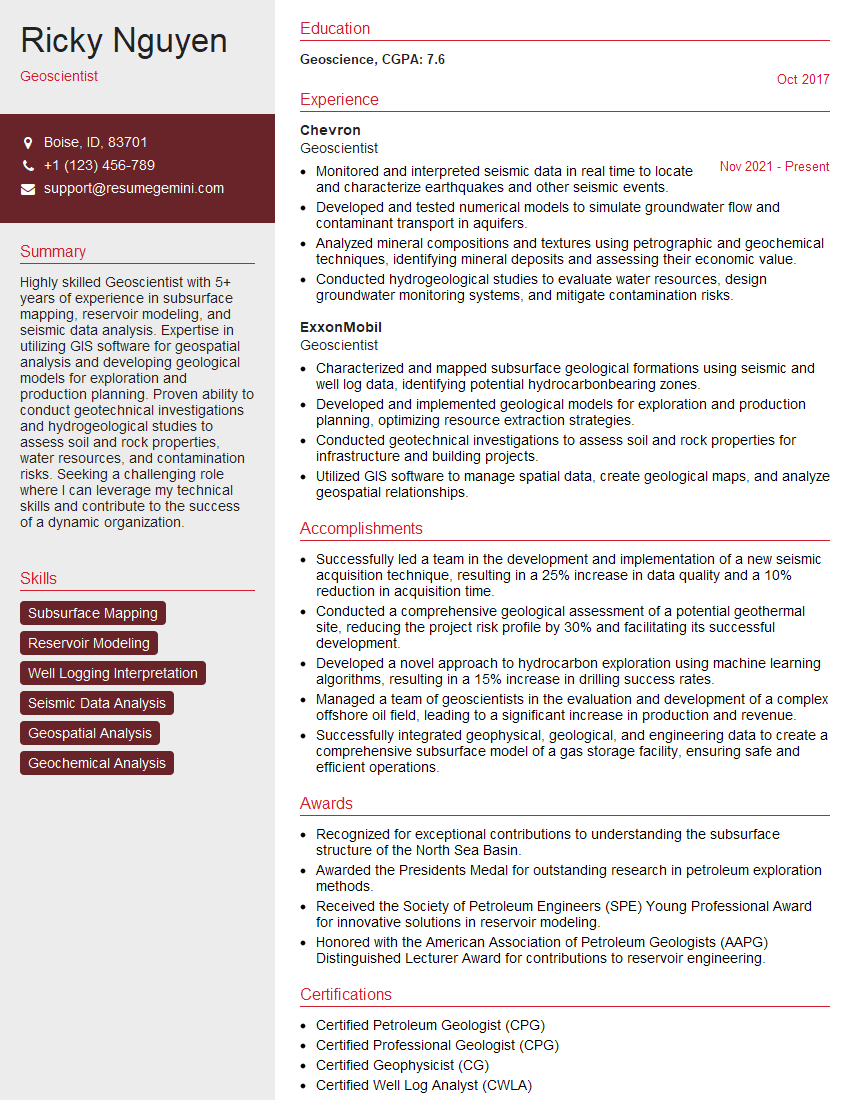Are you a seasoned Geoscientist seeking a new career path? Discover our professionally built Geoscientist Resume Template. This time-saving tool provides a solid foundation for your job search. Simply click “Edit Resume” to customize it with your unique experiences and achievements. Customize fonts and colors to match your personal style and increase your chances of landing your dream job. Explore more Resume Templates for additional options.

Ricky Nguyen
Geoscientist
Summary
Highly skilled Geoscientist with 5+ years of experience in subsurface mapping, reservoir modeling, and seismic data analysis. Expertise in utilizing GIS software for geospatial analysis and developing geological models for exploration and production planning. Proven ability to conduct geotechnical investigations and hydrogeological studies to assess soil and rock properties, water resources, and contamination risks. Seeking a challenging role where I can leverage my technical skills and contribute to the success of a dynamic organization.
Education
Geoscience
October 2017
Skills
- Subsurface Mapping
- Reservoir Modeling
- Well Logging Interpretation
- Seismic Data Analysis
- Geospatial Analysis
- Geochemical Analysis
Work Experience
Geoscientist
- Monitored and interpreted seismic data in real time to locate and characterize earthquakes and other seismic events.
- Developed and tested numerical models to simulate groundwater flow and contaminant transport in aquifers.
- Analyzed mineral compositions and textures using petrographic and geochemical techniques, identifying mineral deposits and assessing their economic value.
- Conducted hydrogeological studies to evaluate water resources, design groundwater monitoring systems, and mitigate contamination risks.
Geoscientist
- Characterized and mapped subsurface geological formations using seismic and well log data, identifying potential hydrocarbonbearing zones.
- Developed and implemented geological models for exploration and production planning, optimizing resource extraction strategies.
- Conducted geotechnical investigations to assess soil and rock properties for infrastructure and building projects.
- Utilized GIS software to manage spatial data, create geological maps, and analyze geospatial relationships.
Accomplishments
- Successfully led a team in the development and implementation of a new seismic acquisition technique, resulting in a 25% increase in data quality and a 10% reduction in acquisition time.
- Conducted a comprehensive geological assessment of a potential geothermal site, reducing the project risk profile by 30% and facilitating its successful development.
- Developed a novel approach to hydrocarbon exploration using machine learning algorithms, resulting in a 15% increase in drilling success rates.
- Managed a team of geoscientists in the evaluation and development of a complex offshore oil field, leading to a significant increase in production and revenue.
- Successfully integrated geophysical, geological, and engineering data to create a comprehensive subsurface model of a gas storage facility, ensuring safe and efficient operations.
Awards
- Recognized for exceptional contributions to understanding the subsurface structure of the North Sea Basin.
- Awarded the Presidents Medal for outstanding research in petroleum exploration methods.
- Received the Society of Petroleum Engineers (SPE) Young Professional Award for innovative solutions in reservoir modeling.
- Honored with the American Association of Petroleum Geologists (AAPG) Distinguished Lecturer Award for contributions to reservoir engineering.
Certificates
- Certified Petroleum Geologist (CPG)
- Certified Professional Geologist (CPG)
- Certified Geophysicist (CG)
- Certified Well Log Analyst (CWLA)
Career Expert Tips:
- Select the ideal resume template to showcase your professional experience effectively.
- Master the art of resume writing to highlight your unique qualifications and achievements.
- Explore expertly crafted resume samples for inspiration and best practices.
- Build your best resume for free this new year with ResumeGemini. Enjoy exclusive discounts on ATS optimized resume templates.
How To Write Resume For Geoscientist
- Highlight your technical skills and expertise in subsurface mapping, reservoir modeling, and seismic data analysis.
- Showcase your experience in using GIS software for geospatial analysis and geological modeling.
- Quantify your accomplishments with specific metrics and results whenever possible.
- Demonstrate your understanding of the industry and current trends in geoscience.
- Proofread your resume carefully for any errors in grammar or spelling.
Essential Experience Highlights for a Strong Geoscientist Resume
- Characterized and mapped subsurface geological formations using seismic and well log data, identifying potential hydrocarbon-bearing zones.
- Developed and implemented geological models for exploration and production planning, optimizing resource extraction strategies.
- Conducted geotechnical investigations to assess soil and rock properties for infrastructure and building projects.
- Utilized GIS software to manage spatial data, create geological maps, and analyze geospatial relationships.
- Monitored and interpreted seismic data in real time to locate and characterize earthquakes and other seismic events.
- Developed and tested numerical models to simulate groundwater flow and contaminant transport in aquifers.
- Analyzed mineral compositions and textures using petrographic and geochemical techniques, identifying mineral deposits and assessing their economic value.
Frequently Asked Questions (FAQ’s) For Geoscientist
What is the role of a Geoscientist?
Geoscientists apply their knowledge of the Earth’s physical, chemical, and biological systems to solve real-world problems, such as finding and extracting natural resources, mitigating natural disasters, and protecting the environment.
What are the essential skills for a Geoscientist?
Essential skills for a Geoscientist include: strong analytical and problem-solving abilities, proficiency in computer software and data analysis techniques, excellent communication and presentation skills, and a passion for the Earth sciences.
What are the career opportunities for Geoscientists?
Geoscientists can work in a variety of industries, including: oil and gas exploration and production, mining, environmental consulting, government agencies, and academia.
What is the job outlook for Geoscientists?
The job outlook for Geoscientists is expected to be good in the coming years, driven by increasing demand for natural resources and environmental protection.
How can I become a Geoscientist?
To become a Geoscientist, you typically need a bachelor’s degree in geoscience, geology, or a related field. Some employers may also require a master’s degree or doctorate.
What are the professional organizations for Geoscientists?
There are several professional organizations for Geoscientists, including the American Geosciences Institute (AGI), the Geological Society of America (GSA), and the Society of Exploration Geophysicists (SEG).
What are the continuing education opportunities for Geoscientists?
Geoscientists can pursue continuing education through conferences, workshops, and online courses offered by professional organizations and educational institutions.